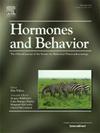Different social experiences drive the development of divergent stress coping styles in female swordtails (Xiphophorus nigrensis)
IF 2.4
3区 医学
Q2 BEHAVIORAL SCIENCES
引用次数: 0
Abstract
Individual variation in stress coping styles is widespread and consequential to health and fitness. Proactive (bold behavior, low stress reactivity, low cognitive flexibility) and reactive (shy behavior, high stress reactivity, high cognitive flexibility) coping styles are found in many species, but the developmental forces shaping them remain elusive. We examined how social influences, specifically mating interactions, shape the development of adult female coping styles with a manipulative rearing experiment using El Abra swordtails, Xiphophorus nigrensis. We raised juvenile females in environments with different male reproductive phenotypes: coercive-only, courting-only, or complex (both coercive and courting males). At adulthood, we measured female stress reactivity (cortisol release following acute stress), boldness (scototaxis and open field responses), and cognitive flexibility (as inhibitory control in a detour task). Females raised in coercive and complex environments developed higher cortisol reactivity than females raised with only courtship. Stress coping trait correlations varied significantly across social environments producing different coping styles across treatments. Traditional proactive and reactive stress coping styles developed in the coercive-only environment with negative correlations between stress response and boldness, stress response and cognitive flexibility, and boldness and cognitive flexibility. Meanwhile, the courtship-only environment produced a negative correlation between stress response and boldness. We thus demonstrate that the relationship between stress response and boldness can be socially modulated. These findings suggest that developmental variation in social experiences can shape suites of traits with complex relationships; and that highly stressful social interactions, such as sexual coercion, can be a strong driver of stress coping styles.
不同的社会经历促使雌性剑尾鱼(xiphohorus nigrensis)发展出不同的应激应对方式。
压力应对方式的个体差异是广泛存在的,对健康和健身有重要影响。主动(大胆行为,低应激反应性,低认知灵活性)和反应性(害羞行为,高应激反应性,高认知灵活性)应对方式在许多物种中都有发现,但形成它们的发展力量仍然难以捉摸。本研究以黑剑尾鱼(Xiphophorus nigrensis)为研究对象,研究了社会影响(特别是交配互动)如何影响成年雌性应对方式的发展。我们在不同雄性生殖表型的环境中饲养雌性幼崽:仅强制、仅求爱或复杂(既有强制雄性,也有求爱雄性)。在成年期,我们测量了女性的应激反应(急性应激后的皮质醇释放)、胆识(趋退性和开阔场反应)和认知灵活性(在绕行任务中的抑制控制)。在胁迫和复杂环境中长大的雌性比只在求偶环境中长大的雌性有更高的皮质醇反应。压力应对特质的相关性在不同的社会环境中差异显著,导致不同治疗的应对方式不同。传统的主动和被动压力应对方式在胁迫环境下发展,压力反应与勇敢、压力反应与认知灵活性、勇敢与认知灵活性呈负相关。与此同时,只有求爱的环境在压力反应和大胆度之间产生负相关。因此,我们证明,压力反应和大胆之间的关系可以社会调节。这些发现表明,社会经验的发展变化可以塑造一系列具有复杂关系的特征;高压力的社会互动,如性胁迫,可能是压力应对方式的强大驱动力。
本文章由计算机程序翻译,如有差异,请以英文原文为准。
求助全文
约1分钟内获得全文
求助全文
来源期刊

Hormones and Behavior
医学-行为科学
CiteScore
6.70
自引率
8.60%
发文量
139
审稿时长
91 days
期刊介绍:
Hormones and Behavior publishes original research articles, reviews and special issues concerning hormone-brain-behavior relationships, broadly defined. The journal''s scope ranges from laboratory and field studies concerning neuroendocrine as well as endocrine mechanisms controlling the development or adult expression of behavior to studies concerning the environmental control and evolutionary significance of hormone-behavior relationships. The journal welcomes studies conducted on species ranging from invertebrates to mammals, including humans.
 求助内容:
求助内容: 应助结果提醒方式:
应助结果提醒方式:


